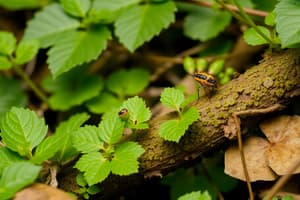Podcast
Questions and Answers
What does the scientific method require of a hypothesis?
What does the scientific method require of a hypothesis?
- It must be falsifiable. (correct)
- It should be based on opinions.
- It should be complex and detailed.
- It must be based on emotions.
What is the main focus of ecology as a scientific discipline?
What is the main focus of ecology as a scientific discipline?
- The classification of non-living materials.
- Understanding individual emotions.
- The interaction of living organisms with their environment. (correct)
- Identifying human impacts on urban settings.
Which of the following best describes the role of evidence in science?
Which of the following best describes the role of evidence in science?
- Evidence is static and does not change over time.
- Evidence can be ignored if it contradicts existing beliefs.
- Evidence is used to confirm that concepts are always correct.
- Evidence is a method to prove concepts wrong. (correct)
Which level of ecological organization focuses on the distribution and abundance of species?
Which level of ecological organization focuses on the distribution and abundance of species?
What series of steps is primarily used in scientific investigations?
What series of steps is primarily used in scientific investigations?
What primarily determines the salinity of seawater?
What primarily determines the salinity of seawater?
Which factor most significantly affects the oxygen levels in lakes during summer?
Which factor most significantly affects the oxygen levels in lakes during summer?
What is the typical salinity range for freshwater bodies?
What is the typical salinity range for freshwater bodies?
In which part of the ocean are the maximum oxygen levels typically found?
In which part of the ocean are the maximum oxygen levels typically found?
What happens to additional solutes once maximum solubility is reached in water?
What happens to additional solutes once maximum solubility is reached in water?
What is the basic unit of study in Ecology?
What is the basic unit of study in Ecology?
What defines a population in ecological terms?
What defines a population in ecological terms?
At which level do ecologists study individual interactions between organisms?
At which level do ecologists study individual interactions between organisms?
Which of the following levels of ecological organization includes physical conditions and biological organisms?
Which of the following levels of ecological organization includes physical conditions and biological organisms?
What is a biome characterized by?
What is a biome characterized by?
What level of ecological organization links communities and ecosystems?
What level of ecological organization links communities and ecosystems?
Which of the following is NOT an abiotic component important to organisms?
Which of the following is NOT an abiotic component important to organisms?
At what ecological level do scientists study the interactions among multiple species?
At what ecological level do scientists study the interactions among multiple species?
What is the primary driving force of the hydrologic cycle?
What is the primary driving force of the hydrologic cycle?
What is unique about the density of ice compared to liquid water?
What is unique about the density of ice compared to liquid water?
What does the term 'evapotranspiration' refer to?
What does the term 'evapotranspiration' refer to?
How does surface tension in water primarily arise?
How does surface tension in water primarily arise?
What is the main consequence of a saturated soil layer during rainfall?
What is the main consequence of a saturated soil layer during rainfall?
Which aquatic layer contains colder, denser water?
Which aquatic layer contains colder, denser water?
Which property of water allows aquatic organisms to experience buoyancy?
Which property of water allows aquatic organisms to experience buoyancy?
Which wavelengths of light penetrate water less effectively?
Which wavelengths of light penetrate water less effectively?
What process occurs when precipitation falls onto vegetation and evaporates back to the atmosphere?
What process occurs when precipitation falls onto vegetation and evaporates back to the atmosphere?
What characteristic of water helps regulate temperature within living organisms?
What characteristic of water helps regulate temperature within living organisms?
What is a solution in the context of water chemistry?
What is a solution in the context of water chemistry?
What primarily drives the distribution of heat in the surface waters of aquatic environments?
What primarily drives the distribution of heat in the surface waters of aquatic environments?
What does 'frictional resistance' of water primarily relate to?
What does 'frictional resistance' of water primarily relate to?
Flashcards
Ecology
Ecology
The study of interactions between organisms and their environment, at different levels.
Scientific Method
Scientific Method
A systematic approach to understanding the natural world through observation. It involves a hypothesis, which is a testable explanation for an observation.
Hypothesis
Hypothesis
A proposed explanation or prediction that can be tested. It has to be testable and falsifiable.
Testable Hypothesis
Testable Hypothesis
Signup and view all the flashcards
Falsifiable Hypothesis
Falsifiable Hypothesis
Signup and view all the flashcards
Ecology Definition
Ecology Definition
Signup and view all the flashcards
Ecological Levels
Ecological Levels
Signup and view all the flashcards
Population (Ecology)
Population (Ecology)
Signup and view all the flashcards
Community (Ecology)
Community (Ecology)
Signup and view all the flashcards
Ecosystem (Ecology)
Ecosystem (Ecology)
Signup and view all the flashcards
Biosphere (Ecology)
Biosphere (Ecology)
Signup and view all the flashcards
Organism Interactions
Organism Interactions
Signup and view all the flashcards
Organism-Environment Interactions
Organism-Environment Interactions
Signup and view all the flashcards
Aquatic environment solute concentration
Aquatic environment solute concentration
Signup and view all the flashcards
Solubility saturation
Solubility saturation
Signup and view all the flashcards
Salinity measurement
Salinity measurement
Signup and view all the flashcards
Oxygen diffusion in water
Oxygen diffusion in water
Signup and view all the flashcards
Oxygen concentration in water
Oxygen concentration in water
Signup and view all the flashcards
Essential substance of life
Essential substance of life
Signup and view all the flashcards
Hydrologic Cycle
Hydrologic Cycle
Signup and view all the flashcards
Driving force of the Hydrologic Cycle
Driving force of the Hydrologic Cycle
Signup and view all the flashcards
Precipitation
Precipitation
Signup and view all the flashcards
Infiltration
Infiltration
Signup and view all the flashcards
Surface Runoff
Surface Runoff
Signup and view all the flashcards
Groundwater
Groundwater
Signup and view all the flashcards
Evapotranspiration
Evapotranspiration
Signup and view all the flashcards
Water's Temperature Stability
Water's Temperature Stability
Signup and view all the flashcards
Ice's Density
Ice's Density
Signup and view all the flashcards
Cohesion
Cohesion
Signup and view all the flashcards
Adhesion
Adhesion
Signup and view all the flashcards
Surface Tension
Surface Tension
Signup and view all the flashcards
Viscosity
Viscosity
Signup and view all the flashcards
Buoyancy
Buoyancy
Signup and view all the flashcards
Light Absorption by Water
Light Absorption by Water
Signup and view all the flashcards
Study Notes
Introduction to Ecology
- Ecology is the scientific study of the relationship between organisms and their environment, including both biotic (living) and abiotic (non-living) components.
- Ecology is an interdisciplinary science, encompassing many fields of study.
- Ecology examines interactions within natural systems, which can be complex.
Life's Scale in Ecology
- Ecological studies can range from the molecular level up to global scales.
- Biologists study life across various levels, from atoms to molecules, organelles, cells, tissues, organs, organ systems, organisms, populations, communities, ecosystems, and the biosphere.
The Nature of Ecology: Populations, Communities, Ecosystems
- A population consists of all individuals of the same species in a given area.
- A community includes all populations of different species interacting within an ecosystem.
- An ecosystem comprises the community and its physical environment.
The Nature of Ecology: Landscapes and Biomes
- Landscapes are larger areas of land or water, comprised of different communities and ecosystems.
- Biomes are geographic regions with characteristic conditions, like tropical rainforests, deserts, and grasslands.
- Major biomes are present throughout North America.
The Nature of Ecology: Organisms and their Environments
- Organisms interact with each other, competing for resources or in predator-prey relationships, and in mutualistic ways.
- Organisms interact with their physical environment at multiple levels; factors like temperature, light, oxygen, and carbon dioxide influence an organism's physiology.
The Nature of Ecology: Ecology as a Science
- Ecology is a continuous process of testing and refining concepts.
- Scientific exploration involves making observations, recording data, organizing it, drawing conclusions and classifying observations.
- Ecologists ask questions, investigating patterns at different ecological levels: the individual, population, community, and ecosystem, to better understand ecological processes and relationships.
Water and Aquatic Environments
- Water is vital to life, covering 75% of the Earth.
- Water's properties, like cohesion, adhesion, surface tension, high viscosity, and temperature regulation, influence the aquatic environment.
- Freshwater and saltwater habitats differ in their salinity and solute content..
- Water interacts with organisms in lakes, ponds, rivers, estuaries and oceans.
- The hydrologic cycle is an important cycle in water environments.
- Light penetration and temperature variation in water affect the distribution and adaptations of aquatic organisms.
- Oxygen levels also play a critical role for aquatic organisms.
Studying That Suits You
Use AI to generate personalized quizzes and flashcards to suit your learning preferences.




